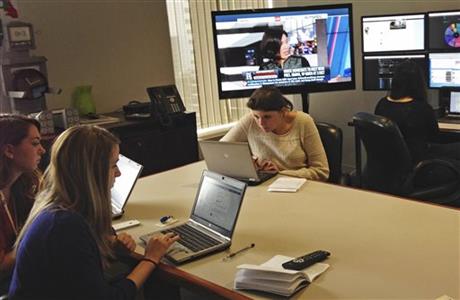
By CARLA K. JOHNSON
In this Oct. 15, 2013 photo, social media experts at the marketing agency FleishmanHillard work in a Chicago command center on the Get Covered Illinois marketing campaign. As the state-contracted agency pivots away from a full-force marketing barrage because of early technical problems with the health care law’s federal website, the social media team has assumed responsibility for educating Illinois consumers and tending to their frustrations. (AP Photo/Carla K. Johnson)
CHICAGO (AP) — Inside a command center at a Chicago marketing agency, a small team of social media experts hunkers down to monitor online chatter about President Barack Obama’s health care law, answer questions on Facebook from discouraged consumers and post information and advice on Twitter.
They are holding down the fort for a $33 million ad campaign planned for Get Covered Illinois, the new health insurance marketplace that’s a cornerstone of the law, also known as “Obamacare,” in what is arguably the biggest social media campaign rolled out by the state of Illinois.
As the state-contracted agency pivots away from a full-force marketing barrage because of early technical problems with the law’s federal website, the social media team has assumed responsibility for educating consumers and tending to their frustrations in Obama’s home state.
“Application has been pending for days. #gettingimpatient,” read one incoming tweet last week, a few days before The Associated Press was given an exclusive peek inside the command center at FleishmanHillard.
“We’re making sure we’re listening and we’re supportive and we’re there for them when they’re having difficulties,” said Meg Poulelis, 28, who leads the team and worked previously on social media accounts for Gatorade and Chevrolet.
Compared to other states, Illinois is in an unusual spot, with millions to spend on promotion but no control over fixing the federal site’s technical glitches. Most of the other 35 states relying on Washington to run their marketplaces are led by Republicans who’ve been hostile to the law and have done nothing to promote it. States promoting the law generally are running their own marketplaces.
Months before the rollout of the law’s marketplaces, one for every state, Illinois officials envisioned a social media marketing push aimed at uninsured healthy young adults, a key demographic for the law’s success.
The campaign would use Twitter, Facebook and YouTube to convince young people to buy health insurance. It would be part of an ad blitz with TV, radio, billboards and other paid advertising.
Now, nearly three weeks after the launch, the social media campaign is underway, but it’s muted. Paid advertising is on hold. With technology problems plaguing the federal website, state officials decided there’s no reason to boost traffic now.
While most Republican-led states are taking a hands-off approach, Illinois sought federal grants that could be used for advertising. The $33 million campaign is funded entirely by those grants.
Get Covered Illinois’ social media launch — compared to some other Democrat-led states — got a late start. Kentucky’s campaign started tweeting May 15, Minnesota’s on May 10 and Washington state on April 16.
Illinois went live with Twitter and Facebook on Oct. 1, the same day the federal healthcare.gov site launched — and then failed under a crush of users. Illinois relies on the federal government to run its insurance-shopping site because state lawmakers didn’t approve a state-run system.
Consumers understandably are seeking answers from Get Covered Illinois, said social media strategist Dave Kerpen of New York-based Likeable Media, who isn’t involved with the Illinois effort.
“Given people’s frustration with the federal website, Get Covered Illinois has to be able to respond promptly and with great care to their customers,” Kerpen said.
They may have missed an opportunity with Chicago attorney Andrew DePaul, 58, who followed Get Covered Illinois on Twitter seeking information. He hopes to lower his family’s insurance costs, but the problems with the federal site have kept him from even seeing his options.
On Oct. 11, he was the one who tweeted to Get Covered Illinois about his frustration and included the hashtag: “#gettingimpatient.”
The social media team tweeted back to him more than three hours later: “Thanks for reaching out. To clarify, are you on the http://healthcare.gov site?”
DePaul replied “Yes” and then heard nothing else. That doesn’t bother him.
“I don’t expect the marketing campaign to troubleshoot the problems. I want their freaking website to work,” he said. “I’ve been a huge cheerleader for the Affordable Care Act and it’s been a great disappointment.”
On Facebook, the team is finessing questions about the federal site. A reply from Oct. 7: “We’re in contact with our fed partners who run healthcare.gov & they are working as quickly as possible to correct these issues. We will update you as soon as they update us, but let us know if you have questions we can help you with in the meantime!”
Kerpen said the team should make its answers more personable when possible.
“It’s the difference between ‘Thank you for your response. We’ll get back to you’ and ‘Thanks, I understand it’s so frustrating,'” Kerpen said. “When used correctly you have the opportunity (with social media) to humanize an organization.”
The social media team is just getting started, said Darrell Jursa, a FleishmanHillard senior vice president in charge of emerging media. Plans include an email newsletter, pitches to influential young bloggers and paid digital advertising.
For now, Twitter followers and Facebook “likes” are small but growing. Most important, Jursa said, more than 121,000 people have gone through the screening tool at GetCoveredIllinois.gov to see whether they qualify for Medicaid or tax credits.
“The whole point is getting people to the website,” he said. “That counts in our minds as a conversion. That’s something that’s very healthy as far as the campaign is concerned.”



